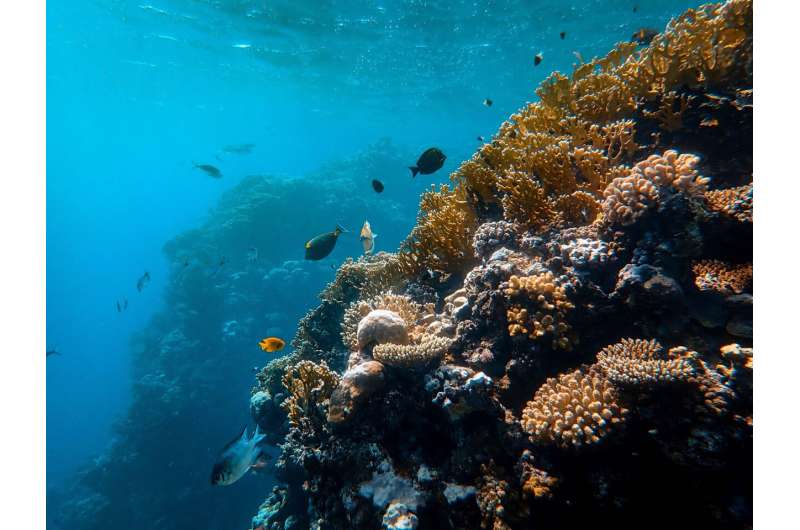This article has been reviewed according to Science X's editorial process and policies. Editors have highlighted the following attributes while ensuring the content's credibility:
fact-checked
peer-reviewed publication
trusted source
proofread
Crust-forming algae are displacing corals in tropical waters worldwide

Over the past few decades, algae have been slowly edging corals out of their native reefs across the globe by blocking sunlight, wearing the corals down physically, and producing harmful chemicals. But in recent years, a new type of algal threat has surfaced in tropical regions like the Caribbean—one that spreads quickly and forms a crust on top of coral and sponges, suffocating the organisms underneath and preventing them from regrowing.
In an article, published in the journal Current Biology , a team of marine biologists report that peyssonnelioid alga crusts, or PACs, are expanding quickly across reefs worldwide, killing off corals and transforming entire ecosystems.
"PACs are an ecological surprise arriving late to the scene of widespread ecosystem degradation of coral reefs in the Anthopocene epoch," writes the team, led by Peter Edmunds of California State University, Northridge. "Within this seascape, PACs may serve as an ecological catalyst that could hasten the global demise of corals on reefs under accelerating climate change."
One of the most challenging aspects of the emerging PAC threat is that the algae can be incredibly hard to identify. There are an estimated 48 different species of PACs, and they can be difficult to tell apart from harmless species like seaweeds because their morphology varies significantly when it comes to color, shape, and structure.
"PAC outbreaks appear to be a rapidly developing crisis on coral reefs throughout the world, where they are exploiting the ecological legacies of decades of reef degradation," write the authors.
Already, between 2012 and 2019, PACs took over 47%–64% of the shallow reefs in St. John, US Virgin Islands. And given the fact that PACs appear to be much more resilient than other related species to the impacts of climate change, including ocean acidification and extreme weather events like hurricanes, the researchers predict that PACs will eventually dominate reefs worldwide. "The recent increases in cover and distribution of PACs on tropical reefs demonstrate their capacity to accelerate the restructuring of tropical benthic habitats," they write.
To slow the spread of PACs and protect the reefs, the authors stress the importance of detecting PAC outbreaks as early as possible. They also encourage researchers to look into the transformative impact of PACs on benthic communities and learn more about tropical reef resilience against PAC outbreaks.
"Suitable progress in these areas will only be obtained by a well-funded synergy of ecological, phylogenetic, and multi-omic studies that must start with the ability to quickly and accurately identify the taxa driving the global advance of PACs," write the researchers.
More information: The rising threat of peyssonnelioid algal crusts on coral reefs, Current Biology (2023). DOI: 10.1016/j.cub.2023.08.097. www.cell.com/current-biology/f … 0960-9822(23)01183-1
Journal information: Current Biology
Provided by Cell Press



















